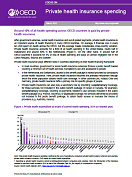Health policies and data
Private Health Insurance
Private Health Insurance Spending - Brief, march 2022
 |
Around 10% of all health spending across OECD countries is paid by private health insurance. After government schemes, social health insurance and out-of-pocket payments, private health insurance is an important source of health financing in many OECD countries. On average, it finances 10% of all health spending across the OECD, but this average masks considerable cross-country variation. Private health insurance accounts for a third of all health spending in the United States, nearly half in Switzerland and around 60% in the Netherlands. On the other hand, in around half of OECD countries it accounts for 5% or less of health spending and plays an almost negligible role in the Czech Republic, Estonia and Sweden. These substantial differences can be explained by the fact that private health insurance plays different roles in countries:
This brief analyses private health insurance spending in OECD countries in depth relying on the last health spending data submission using the System of Health Accounts framework and additional health data.
|
FEATURED DATA
Note: Total private health insurance spending is defined as the sum of spending by compulsory private health insurance schemes and voluntary private health insurance schemes. CHE stands for current health expenditure.
* United States: Spending by private health insurance cannot be distinguished between compulsory and voluntary. Since the introduction of the individual mandate to purchase health insurance 2014 as part of the Affordable Care Act, the majority is considered as compulsory.
Source: OECD Health Statistics 2023.
THE OECD Study on Private Health Insurance
The OECD Study on Private Health Insurance was completed between 2001 and 2004. The work was carried out jointly by the Health Division of the Directorate for Employment, Labour and Social Affairs and the Insurance Committee of the Directorate for Fiscal and Financial Affairs. The final report, Private Health Insurance in OECD Countries, was released in November 2004.
The role of private health insurance can vary considerably across OECD countries, due to the historical, political and market factors that have influenced the development of health systems. The study assesses the role that private health insurance (PHI) plays in OECD member countries. The main aims of the study were:
- To identify policy issues arising from the interdependence of private health insurance with public health coverage schemes;
- To assess mixed models of private/public health insurance against health policy objectives;
- To assess the impact of governmental regulation on health systems performance;
- To analyse the challenges and benefits related to private health insurance in different insurance mixes, and the preconditions for the development of an efficient and equitable health insurance market.
The main policy questions addressed have included:
- What is the impact of PHI markets and different insurance mixes on equity in the health system?
- What risks and opportunities does PHI pose to cost pressures on health systems?
- How does PHI improve responsiveness of health systems?
- What regulatory mechanisms and financial incentives can deliver equity, efficiency, and responsiveness from different insurance mixes and PHI markets?
Key publications from the OECD study on Private Health Insurance (2001-2004)
The OECD completed a three-year study on private health insurance in 2004. The following reports were released as part of the study:
- Private Health Insurance in OECD Countries
- Private Health Insurance in OECD Countries: The Benefits and Costs for Individuals and Health Systems
- Private Health Insurance in France
- The Slovak Health Insurance System and the Potential Role for Private Health Insurance
- Private Health Insurance in Australia: A Case Study
- Private Health Insurance in Ireland: A Case Study
- Private Health Insurance in the Netherlands: A Case Study
- Proposal for A Taxonomy of Health Insurance
FURTHER READING
- Health Statistics
- Health Policies
- Health Publications
- Health Working Papers
- Learn more about the Insurance Committee of the Directorate for Fiscal and Financial Affairs (DAF)
CONTACT US
 Follow us on Twitter via @OECD_Social
Follow us on Twitter via @OECD_Social
Related Documents